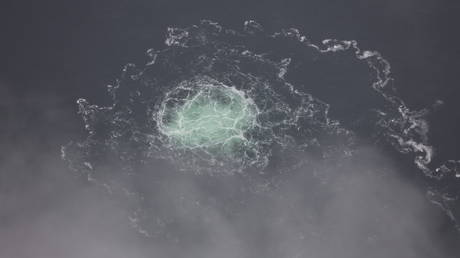Nord Stream Sabotage: The Role of Western Media in Promoting Government Agendas
In the aftermath of the Nord Stream pipeline destruction, Western media outlets revealed their biases by echoing government narratives.

In the instance of the Nord Stream I and II pipelines' destruction in September 2022, an event involving unidentified perpetrators believed to have state backing, the response by European countries and media was notably subdued. The attack led to a significant ecological disaster by releasing extensive amounts of methane into the atmosphere. Despite this, subsequent actions by European governments, particularly the EU and Germany, seemed aimed more at obscuring and minimizing the incident than at investigating and identifying those responsible.
Countries that were direct victims of the sabotage, including Sweden and Denmark, halted their investigative efforts promptly. In an ideal scenario, NATO would have pursued actions against the perpetrator state as per the alliance's established protocols. However, initial accusations pointing to Russia were eventually set aside and replaced by narratives implicating Ukraine as the sole perpetrator, a storyline heavily promoted through both governmental statements and media coverage.
The present narrative, despite being challenged and leading to disputes, notably between Germany and Poland, carries significant implications. Accusations are now levelling against Poland for its probable involvement in the sabotage and its disregard for Germany's weakened stance on the matter.
The Western media's role in these developments is increasingly questioned. Traditionally tasked with exposing governmental malpractices and holding public officials to account, the media have instead shown a tendency to perpetuate official narratives without sufficient scrutiny. This behavior is highlighted, for instance, by the German news outlet Berliner Zeiturung, which criticized mainstream media for their unquestioning reproduction of government perspectives.
Moreover, critical voices like journalist Seymour Hersh, who presented a theory involving the US in the pipeline attack, have been dismissed and marginalized within mainstream discussions. This treatment is emblematic of a broader trend where media narratives align closely with official accounts, neglecting exploratory and unbiased journalism.
This systemic alignment of major media outlets with governmental narratives not only undermines journalistic integrity but also contributes to a growing public mistrust in mainstream media. A recent poll indicated a significant portion of the German public distrusts mainstream media coverage of international issues like the Israel-Palestine conflict, revealing a skepticism towards perceived biases.
The international perspective, as viewed by platforms like India's Firstpost, questions whether Western powers will hold accountable any proven involvement of Ukraine in the sabotage, suggesting that failure to do so would reveal a double standard in addressing terrorism.
As the role of the media in Western societies becomes more akin to that of a governmental tool, the implications for public trust and the credibility of the press are profound, influencing not only domestic perceptions but also international views on Western integrity and transparency.This growing disillusionment with both political leaders and the media has far-reaching consequences for the fundamental principles of democracy and accountability. The traditional ideal of journalism as the "fourth estate" that provides checks and balances on power is clearly eroding. Instead of serving as a critical watchdog, the media often appears to support narratives that align with state interests, even when these narratives may diverge significantly from the truth.
One of the most troubling aspects of this situation is the apparent complicity of the media in perpetuating misinformation regarding the Nord Stream sabotage. Rather than scrutinizing official sources and demanding transparency regarding the evidence available, many media outlets seem content to regurgitate state-approved messages. This has created an environment ripe for manipulation, where facts are easily obscured and dissenting voices are marginalized.
The case of the German prosecutors' handling of a Ukrainian suspect is particularly telling. The public was kept in the dark about this critical development until it was too late, illustrating a significant breakdown in communication and accountability. The failure to report on key aspects of the investigation raises questions about the integrity of not only the political system but also the media that is supposed to inform the public.
Moreover, the accusation of "conspiracy theory" directed at journalists and analysts who question mainstream narratives signals an unsettling trend towards censorship and disinformation. The media plays a crucial role in shaping public understanding, and when this role is compromised, it leads to a population that is ill-informed about pressing issues. The refusal to entertain alternative viewpoints, especially those that implicate powerful players, is emblematic of a broader fear within journalistic circles: the potential repercussions of crossing established narratives.
As citizens in Western democracies grapple with declining trust in their institutions, the question arises: what can be done to restore accountability? A return to investigative journalism that prioritizes truth over narrative is essential. This would involve not only a reexamination of the relationships between media and state officials but also an emphasis on transparency and public interest. Independent journalism must be supported and funded to ensure diverse perspectives can emerge without the constraints of political or corporate pressures.
Calls for greater accountability are emerging, with prominent figures like Sahra Wagenknecht advocating for parliamentary inquiries into allegations surrounding the Nord Stream attacks. This kind of political action is necessary, but it must be accompanied by a cultural shift within the media landscape itself. Journalists must reclaim their role as independent analysts, holding those in power accountable and ensuring that the public is fully informed about actions that impact their lives.
In conclusion, the situation surrounding the Nord Stream sabotage serves as a troubling case study of the convergence of political power and media influence. As Western countries grapple with the ramifications of this incident, one thing becomes clear: without a robust, independent media that dares to challenge powerful interests, the ideals of democracy and accountability remain at serious risk. The urgency for reform is undeniable, as the future of informed public discourse hangs in the balance, with the stakes higher than ever as the world faces increasingly complex geopolitical challenges.
Ian Smith for TROIB News
Find more stories on the environment and climate change on TROIB/Planet Health












